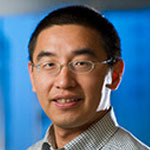
Haifeng Gao, assistant professor in the department of chemistry and biochemistry, was honored with an NSF Early Career Development Award (CAREER) for his proposal entitled “Chain-growth Polymerization of AB2 Monomer to Produce Hyperbranched Polymers”. Honoring the integration of outstanding research and education within their individual organizations, the NSF CAREER Award is the most prestigious award given by the U.S. government to young faculty in science and engineering.
Gao’s proposed research focuses on new methodologies for polymer synthesis and offers, for the first time, a novel one-pot polymerization method that can produce hyperbranched polymers with well-defined structures and compositions including tunable molecular weights, low polydispersity, a high degree of branching, and various functional groups. Gao’s research goal, together with a closely related education and outreach program, will enable him to further establish strong credentials in the field of polymer chemistry as a scientist, an educator and a leader within our local community.
Gao’s research at Notre Dame embraces all the aspects of successful materials design, from building structure-tailored polymers to analyzing their supermolecular organization and finally to testing their macroscopic properties. The main thrust of his research group is to design functional polymers and understand their structure-property relationships. The soft nanomaterials developed are expected to meet critical challenges in broad fields of nanotechnology and biomedical sciences, including nanodevice construction, gas separation, catalysis, drug delivery and molecular electronics.
Gao received his bachelor’s (2000) and master’s degrees in polymer chemistry from Fudan University in Shanghai, China and his doctorate in chemistry from Carnegie Mellon University in Pittsburgh, Penn. Prior to joining Notre Dame in 2011, Gao was a postdoctoral fellow in the department of chemistry at the University of California at Berkeley, and the Molecular Foundry at the Lawrence Berkeley National Laboratory in Berkeley, Calif.
Originally published by at nano.nd.edu on March 18, 2016.